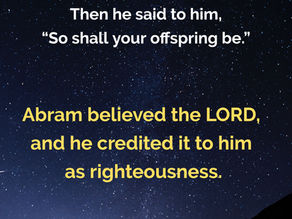Psalm 78:1-8 - His Story
- Chad Werkhoven
- May 30, 2025
- 4 min read
History is one of the ways God passes on faith from one generation to the next.
Psalm 78:1–8
A maskil of Asaph.
1 My people, hear my teaching;
listen to the words of my mouth.
2 I will open my mouth with a parable;
I will utter hidden things, things from of old—
3 things we have heard and known,
things our fathers have told us.
4 We will not hide them from their descendants;
we will tell the next generation
the praiseworthy deeds of the Lord,
his power, and the wonders he has done.
5 He decreed statutes for Jacob
and established the law in Israel,
which he commanded our fathers
to teach their children,
6 so the next generation would know them,
even the children yet to be born,
and they in turn would tell their children.
7 Then they would put their trust in God
and would not forget his deeds
but would keep his commands.
8 They would not be like their fathers—
a stubborn and rebellious generation,
whose hearts were not loyal to God,
whose spirits were not faithful to him.
Canons of Dordt
Point 2 - Limited Atonement
Article 6: Unbelief, a Human Responsibility
However, that many who have been called through the gospel
do not repent or believe in Christ
but perish in unbelief
is not because the sacrifice of Christ offered on the cross
is deficient or insufficient,
but because they themselves are at fault.
Article 7: Faith God’s Gift
But all who genuinely believe and are delivered and saved
by Christ’s death from their sins and from destruction
receive this favor solely from God’s grace—
which God owes to no one—
given to them in Christ from eternity.
Summary
We only read the introduction to Psalm 78, as in total it is 72 verses long. It chronicles the history of the first few generations of Israelites who were freed from their slavery in Egypt, and brought by God through the wilderness and into the Promised Land. But, being a psalm, it does so in a poetic way that emphasizes themes more than details.
Anybody who's been to Sunday School knows that this history isn't a glowing picture of Israel's faithfulness to God; as v8 summarizes it, these people were stubborn and rebellious... their hearts were not loyal to God and their spirits were not faithful to him. But such characteristics certainly are not limited to these particular people - those are traits that apart from God's grace we all share!
What's striking about Psalm 78's introduction is that as ugly as this history was, subsequent generations were not to hide this history from their descendents; they must tell the next generation. As the psalmist Asaph wrote these words, Israel was at its zenith. The kingdom was strong and wealthy. It would have been easy and attractive to whitewash its history and only tell the stories that magnified their ancestors' courage and faith.
But that's the opposite of what Asaph, inspired by the Holy Spirit, encourages the Israelites to do. As it's been said, those who ignore history are condemned to repeat it.
Dig Deeper
Psalm 78 gives insight as to how we ought to learn from history. First of all, God is at the center of history, not us. Often, we view periods of history as being a good or bad time based on what things were like for those who lived through it. If they were prosperous, it was good, but not if they were poor. Faithfulness precipitated good times, while rebelliousness ushered in bad times.
But our history lessons must be centered on telling the next generations the praiseworthy deeds of the LORD. How people reacted to or experienced the LORD's deeds is of secondary concern. Viewing history from this perspective results in a much steadier trajectory!
Second, Psalm 78 magnifies the importance of fathers teaching their children about how God works in and through history. Fathers are to teach the children of the statutes God has decreed in addition to His power, and the wonders He has done. When our children are taught such truths they will ordinarily put their trust in God and will not forget His deeds but would keep His commands.
Finally, not only must fathers teach their children such things, but they must live according to that which they are teaching. Mark Futato notes that the final verse of this introduction makes it "clear that the fathers told their children the right things but then failed to do the right things themselves. Thus while knowledge does not guarantee faithfulness, knowing the story is the foundation for faith and hope and life.”
ACKNOWLEDGE WHO GOD IS: Our Father, who has done praiseworthy deeds;
ALIGN YOUR LIFE WITH GOD'S WILL: Pray that you will actively be engaged to teach the next generations of the wonders the LORD has done and that your heart would be loyal to God and your spirit faithful to Him;
ASK GOD FOR WHAT YOU NEED:
Read the New Testament in a year! Today: Romans 12




















Wow! I think of the song "Parents tell your children" in the reference "we are only one generation from disbelief." Your insite, Parents tell your children the history of the Bible must include the bad with the good, opens my eyes. As you said,"so history does not repeat itself."
This is true of our personal history as Christians as well. We love to tell our "good stories" to our kids... but hesitate sharing our weaknesses. May we be brave enough to share God's lessons to us through the good and the tough times.